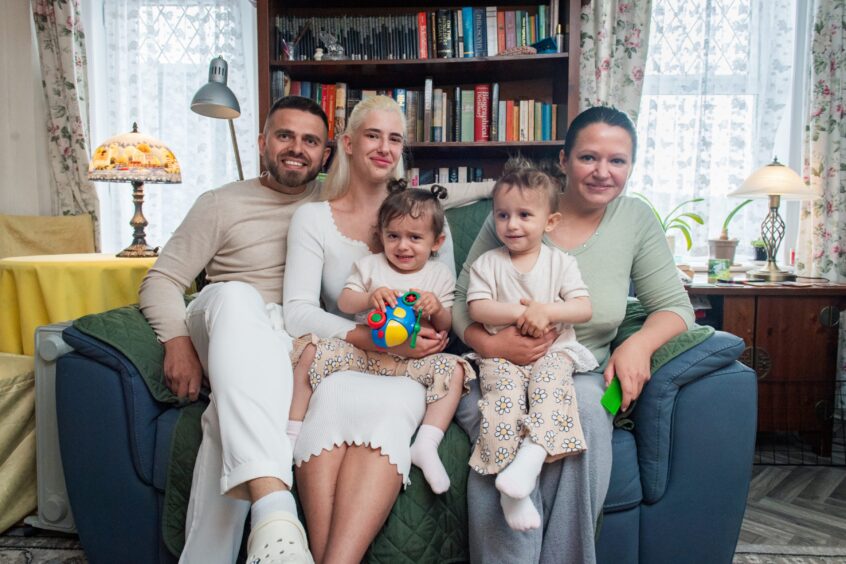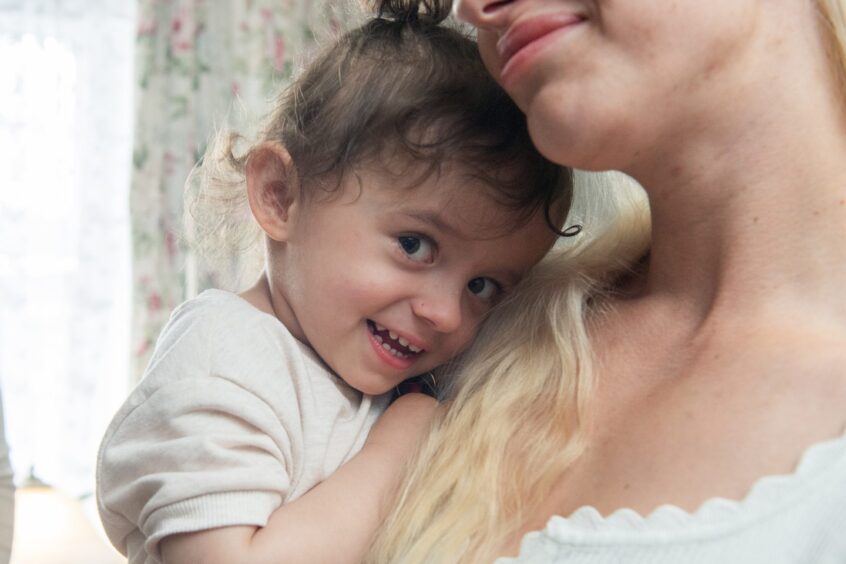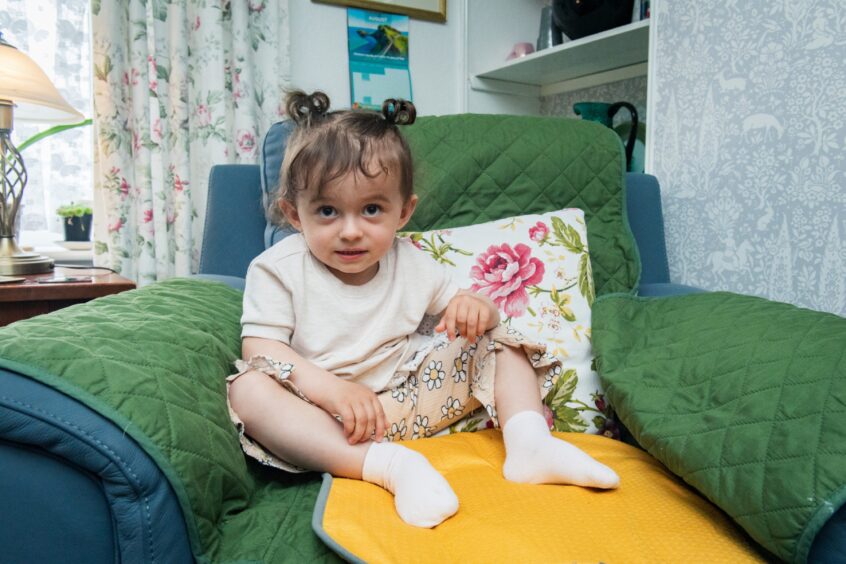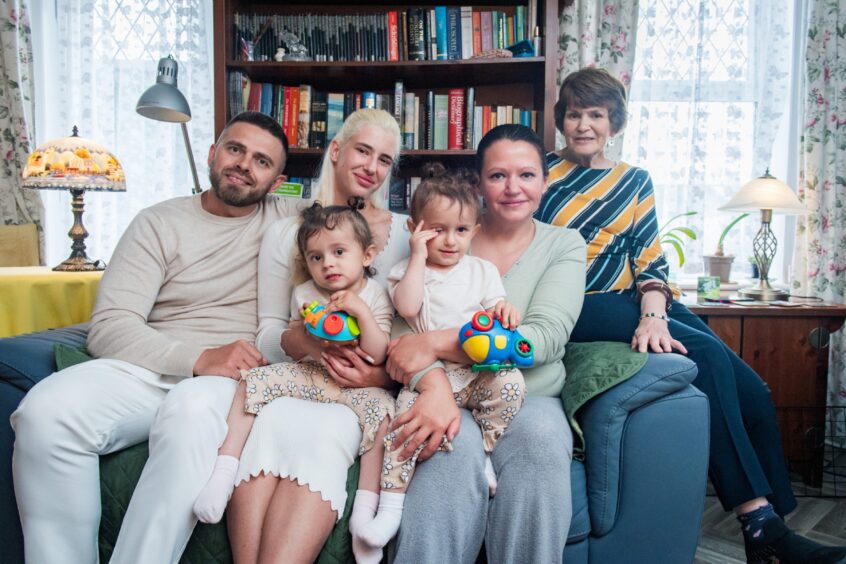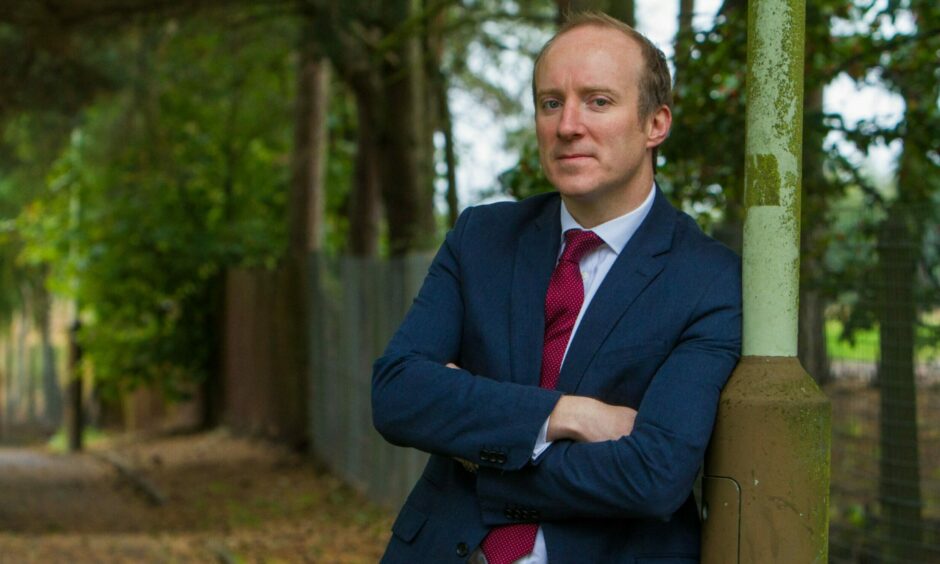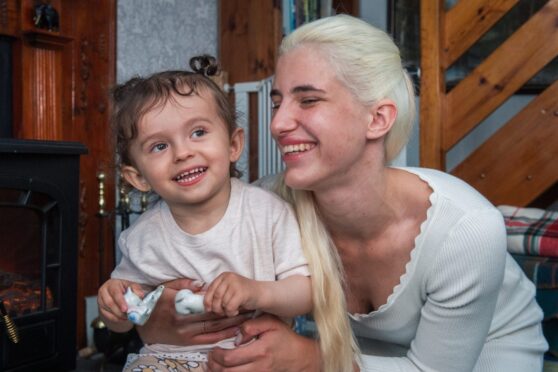
A disabled Ukrainian toddler whose family fled to Scotland may never walk because a vital treatment provided free in her war-torn homeland is unavailable on our NHS.
Mum Yelyzaveta Nazarova – known as Elizabeth in English – found safety in Aberchirder, near Huntly in Aberdeenshire, with her husband, Vitalii, and twin daughters Zlata and Zoriana in November.
The girls are now two years old but Yelyzaveta, 20, says the family are caught between the horrors of war and a relentless fight to save Zlata from a lifetime in a wheelchair.
The NHS says it will not provide her with Bobath therapy, a special kind of treatment used to help mobility in children with cerebral palsy.
The therapy is offered free and on a regular basis in Ukraine but in Scotland, health chiefs say they will only provide Zlata with weekly play therapy sessions.
The family had no access to a walker or stander when they first arrived so had to make use of homemade equipment created by a friend.
By the time a proper one had been provided, they had waited so long that Zlata had outgrown the special splints for her feet and had to wait another four months.
Zlata is also supposed to have an MRI scan every three to four months to monitor her hydrocephalus – a neurological disorder caused by an abnormal build-up of cerebrospinal fluid.
Her parents say this has never been done in the almost full year they have lived in Aberdeenshire.
Grateful but desperately worried
Yelyzaveta and Vitalii are grateful for the help they have received but are desperately worried for their daughter after doctors found her condition has regressed significantly during her time in Scotland.
Tests in July showed her motor function had dropped from “level two” while in Ukraine to “level four” – the second worst classification possible and a strong indication that unless she gets the help she needs, Zlata will likely never walk.
“Zlata’s condition is worsening and time is running out – we need to secure the specialised treatment she desperately requires,” Yelyzaveta said.
“We are left to navigate this nightmare on our own with no clear path forward. Every day that passes feels like a lost opportunity to help our daughter.
“The NHS has provided equipment and basic care but their rehabilitation services are not enough – essentially just play sessions with Zlata once every week or two.
“Zlata cannot walk, crawl, or feed herself, and the only thing she has left is a big smile and a deep gratitude for life.
“Her determination to face all these obstacles gives us hope.”
Family’s torment after traumatic escape
Yelyzaveta was a professional circus artist in the National Circus of Ukraine in Kyiv, while her 39-year-old husband worked in real estate.
The couple were forced to flee to Lviv, near the Polish border, in February 2022 after a rocket exploded outside their apartment building.
It was in Lviv where Yelyzaveta gave birth to Zlata and Zoriana at just 30 weeks.
Zlata suffered a stroke shortly after the birth, which resulted in eight cysts and significant brain damage.
The couple have secured a place for her at a clinic in London but costs for next year alone are estimated to be around £20,000.
They have now set up the website helpzlata.co.uk to raise funds for her treatment.
Their host in Scotland, Georgia Stuart, has been struggling to find them a place to live in London and has been writing to officials about the possibility of transferring sponsorship to another host under the Homes for Ukraine scheme.
Georgia said: “We are currently writing to as many boroughs as possible to little avail.
“I wasn’t expecting to be involved in this final transfer process when I became a sponsor. I thought the government would help more.”
The family’s agreed year-long stay with Georgia ends on November 17.
But their harrowing experience is one shared with others who have been brought to Scotland under the Homes for Ukraine scheme.
Incredibly, this is the second time the host has had a family who couldn’t get the right help while in Scotland.
We reported previously that a mother and daughter who stayed with Georgia were forced to return to Ukraine rather than wait four months for NHS dental treatment.
Meanwhile, Yelyzaveta’s mother Liudmyla flew back to Ukraine in June for emergency surgery after being left on a long waiting list for diagnostic tests in Scotland.
In two weeks, she will return for further tests. The family says the NHS in Scotland has still not provided an initial diagnosis.
North East MSP Michael Marra has written to First Minister John Swinney demanding answers.
He said: “The first minister should reflect on the lessons of Zlata’s case for the perilous state of our NHS but first and foremost he should act to try and make good on the promise of a better life we made as a country to our Ukrainian brothers and sisters.”
NHS Grampian said it cannot comment on individual cases.
It added: “Speaking generally, treatments and therapies provided to patients are required to have good clinical evidence of efficacy.
“When a patient does make direct contact with us, we are more than willing to discuss their case with them – including their diagnosis, treatment and any further care they received.”
The Scottish Government said: “We are sorry to hear about the problems Zlata’s family have had in accessing care for their daughter.
“The health and welfare of all displaced Ukrainians remains a priority.
“However, the challenges the NHS is facing are not unique to Scotland and are being felt across the rest of the UK.
“The Scottish Government remains focused on supporting services to address and alleviate these pressures and we are working to clear the backlog of planned care appointments caused by the pandemic.”

Enjoy the convenience of having The Sunday Post delivered as a digital ePaper straight to your smartphone, tablet or computer.
Subscribe for only £5.49 a month and enjoy all the benefits of the printed paper as a digital replica.
Subscribe